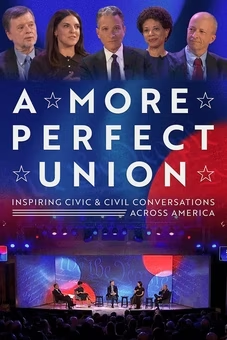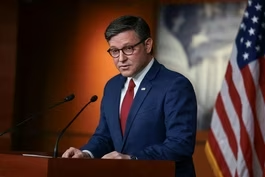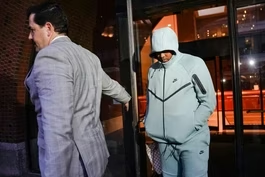
David Szalay on his Booker Prize-winning novel 'Flesh'
Clip: 11/12/2025 | 5m 45sVideo has Closed Captions
David Szalay on winning the Booker Prize for his novel 'Flesh'
The Booker Prize is one of the world’s most prestigious literary awards, given annually to a single novel written in English and published in the United Kingdom or Ireland. This year’s winner is David Szalay's novel, “Flesh.” Senior arts correspondent Jeffrey Brown spoke with him for our arts and culture series, CANVAS.
Problems playing video? | Closed Captioning Feedback
Problems playing video? | Closed Captioning Feedback
Major corporate funding for the PBS News Hour is provided by BDO, BNSF, Consumer Cellular, American Cruise Lines, and Raymond James. Funding for the PBS NewsHour Weekend is provided by...

David Szalay on his Booker Prize-winning novel 'Flesh'
Clip: 11/12/2025 | 5m 45sVideo has Closed Captions
The Booker Prize is one of the world’s most prestigious literary awards, given annually to a single novel written in English and published in the United Kingdom or Ireland. This year’s winner is David Szalay's novel, “Flesh.” Senior arts correspondent Jeffrey Brown spoke with him for our arts and culture series, CANVAS.
Problems playing video? | Closed Captioning Feedback
How to Watch PBS News Hour
PBS News Hour is available to stream on pbs.org and the free PBS App, available on iPhone, Apple TV, Android TV, Android smartphones, Amazon Fire TV, Amazon Fire Tablet, Roku, Samsung Smart TV, and Vizio.
Providing Support for PBS.org
Learn Moreabout PBS online sponsorshipGEOFF BENNETT: The Booker Prize is one of the world's most prestigious literary awards given annually to a single novel written in English and published in the U.K.
or Ireland.
MAN: The winner of the 2025 Booker Prize is "Flesh."
(CHEERING) GEOFF BENNETT: Its winner receives 50,000 British pounds, about $65,000, and typically a big boost in book sales.
This year's winner announced at a gala event in London Monday night is Hungarian-British writer David Szalay for his novel "Flesh."
Senior arts correspondent Jeffrey Brown spoke with him earlier today for our arts and culture series, Canvas.
JEFFREY BROWN: All right, well, David Szalay, congratulations.
You were on the short list for this prize once before.
And I saw the other night at the ceremony that you said this time was better.
(LAUGHTER) JEFFREY BROWN: So you had fun?
DAVID SZALAY, Author, "Flesh": This time was better, for the one very obvious reason, of course, but also because I did -- I was determined to actually enjoy the ceremony whatever happened, because when I was last involved in this in about 2016, it was really a sort of horrendously stressful experience, and I didn't want to repeat that.
So I made a great effort to stay calm this time round, which did involve persuading myself that I absolutely wasn't going to win.
So when it did actually happen, I got quite a shock.
JEFFREY BROWN: So for those who haven't read it yet, tell us a little bit about the story of Istvan that you wanted to give us.
DAVID SZALAY: I mean, it covers many decades of the main character's life.
It starts when he's 15 years old in a kind of housing estate in provincial Hungary, and it then covers the next 40 or 50 years of his life until he's in sort of late middle age.
But it does that in a series of glimpses.
It's made of 10 chapters, each of which provides a brief glimpse of a few weeks or months of his life, and the chapters are then separated by many years.
JEFFREY BROWN: We see him at war, in the army.
We see him kind of lost at home.
We see him years later ending up in London as a security guard, all kinds of episodes.
DAVID SZALAY: Exactly.
It covers a huge range of different environments, really, from kind of relative poverty in rural Hungary to great wealth in 21st century London.
So it's a kind of -- it's a very broad canvas in some respects, but, as I say, it's quite intimate as well because it's made of these brief glimpses of the character.
JEFFREY BROWN: It is a story about a person living between worlds in a sense, and also some way a novel about contemporary Europe, the differences that you yourself have seen, right?
DAVID SZALAY: Sure, sure.
No, absolutely.
I mean, I grew up in England, but my dad is Hungarian.
And as an adult, I moved to Hungary and lived there for some years.
So, yes, I mean, this sort of movement around contemporary Europe.
I mean, movement in terms of making your life somewhere else, is something that, yes, I have very immediate experience of.
But it's also a very major social phenomenon generally.
I mean, the total number of people involved is many, many millions.
So I wanted to write a book that had a great sort of realism in terms of its portrayal of the world as it is.
And that realism is important to sort of - - for the emotional impact of the book.
JEFFREY BROWN: What has stood out for many and for me in my reading is the writing itself, the episodic nature of your storytelling and then the spareness of the writing itself.
Roddy Doyle, the writer who served as the chair of the Booker jury, he said: "I don't think I have read a novel that uses the white space on the page so well.
It's as if the author is inviting the reader to fill the space to almost create the character with him."
I thought that was a very interesting way of putting it.
DAVID SZALAY: Absolutely.
JEFFREY BROWN: Using us to help you create the character.
DAVID SZALAY: Yes.
JEFFREY BROWN: Do you think of it that way?
DAVID SZALAY: I do.
I do.
And, I mean, the fact is that all books work like that, obviously.
I mean, it's what -- it's -- reading is always an imaginative collaboration between the writer and the reader.
Reading is an imaginative act, so absolutely.
And this book does perhaps take that quite far, because, as Roddy said, it leaves a lot of white space, not only literally, but also sort of metaphorically, in that there is a lot about the character that we are not told and that the reader themselves has to supply.
And I hope, despite that, that, by the end of the book, that the reader has a very intense and quite full idea of who this person is.
JEFFREY BROWN: Have you had a moment yet to absorb the meaning of this or the impact on you as a -- for book sales or you as your own writing life?
DAVID SZALAY: It will take time for it to completely sink in.
When I didn't win in 2016, when I was nominated, but didn't win, I told myself, and I believed it and I think probably still do, that one good thing about it was that it would sort of guard me from complacency and laziness, not winning the prize then.
So now I guess I have to be on my guard against those things now that I have won it and I will do my best.
JEFFREY BROWN: All right, David Szalay, thank you again, and congratulations.
DAVID SZALAY: Thank you very much.
A pleasure to be on.
Children wounded in Gaza share stories as they heal in U.S.
Video has Closed Captions
Clip: 11/12/2025 | 10m 39s | Children wounded by the war in Gaza share their stories as they heal in the U.S. (10m 39s)
House passes bill to end longest government shutdown
Video has Closed Captions
Clip: 11/12/2025 | 4m 8s | House passes bill to end longest government shutdown (4m 8s)
MLB pitchers face charges in latest sports gambling scandal
Video has Closed Captions
Clip: 11/12/2025 | 5m 44s | Indictment of MLB pitchers raises questions about impact of legal sports betting (5m 44s)
News Wrap: Trump urges Israeli president to pardon Netanyahu
Video has Closed Captions
Clip: 11/12/2025 | 5m 45s | News Wrap: Trump urges Israeli president to pardon Netanyahu (5m 45s)
Ousted immigration judge describes deepening court backlog
Video has Closed Captions
Clip: 11/12/2025 | 6m 45s | Ousted immigration judge describes deepening court backlog (6m 45s)
Trump faces fresh Epstein questions after release of emails
Video has Closed Captions
Clip: 11/12/2025 | 6m 8s | Trump faces fresh Epstein questions as new emails and files are released (6m 8s)
U.S. carrier in Caribbean amid Venezuela tensions
Video has Closed Captions
Clip: 11/12/2025 | 6m 42s | U.S. carrier in Caribbean amid Venezuela tensions and outcry over drug boat strikes (6m 42s)
Providing Support for PBS.org
Learn Moreabout PBS online sponsorship
- News and Public Affairs

FRONTLINE is investigative journalism that questions, explains and changes our world.

- News and Public Affairs

Amanpour and Company features conversations with leaders and decision makers.












Support for PBS provided by:
Major corporate funding for the PBS News Hour is provided by BDO, BNSF, Consumer Cellular, American Cruise Lines, and Raymond James. Funding for the PBS NewsHour Weekend is provided by...






